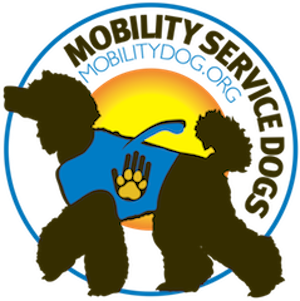AGENCY AND THE ETHICS OF THE DOG-HUMAN RELATIONSHIP – PART 2
A Large White Service Dog and His Handler (Courtesy: MobilityDog.org)
Dogs contribute to many aspects of our lives – economic, social and cultural, to name but a few. What do we owe them in return for their contributions?
As discussed In Part 1 of this topic, we owe our canine companions a degree of agency including control over aspects of their lives and confidence their needs will be met. Since humans have the greater power in our relationships with dogs, and because dogs don’t have an easy way to give or withhold consent for the jobs we give them, we bear the responsibility of ensuring that they live healthy, fulfilling lives.
But what does this responsibility entail? Keep reading to learn more.
The Five Domains Model
One model reflecting the universe of elements affecting animal well-being incorporates the following five domains:
Nutrition – The quality and quantity of nourishment we provide.
Environment – The social and physical conditions in which our dogs live.
Physical Health – The state of physical health our dogs experience.
Behavioral Interactions – The ways our dogs interact with us and with other canines as we train and work with them.
Mental State – The psychological and emotional health we foster in our canine companions.
Domain: Nutrition
The type and amount of food a dog should receive depends on the kind and quantity of work the dog performs and on the animal’s physical condition (age, joint health and weight, for example). The variety of dog food and dietary supplements has burgeoned in recent years, giving dog guardians a vast array of options for keeping their animals well-fed (but not overindulged). Two fads that have had adverse effects on dog health are grain-free diets and raw meat or meat-only diets. Dogs are not wolves – they need to consume both protein and carbohydrates. Modern canines evolved to exploit the food practices of humans, including the availability of grains and other plants. Excessive protein can affect a dog's coat and skin health, potentially leading to issues like dull coat, excessive shedding, or skin irritation. Raw meat can also bring the risk of microbial contamination.
Domain: Environment
White Poodle Service Dog Laying On The Grass Outdoors (Courtesy: MobilityDog.org)
Working dogs do their jobs across a wide range of environmental conditions, from indoors in therapy rooms to snowy forests and scorching deserts. With proper care, they can thrive in any of these situations.
We all know that dogs cannot thermoregulate, as humans do, through perspiration. They may need to pant aggressively to avoid overheating.
They may also need paw protection to prevent blistering their paw pads on hot surfaces. If you can’t place your hand comfortably on a summer sidewalk for at least 7 seconds, it’s too hot for your pooch to safely walk on.
Domain: Physical Health
Some dogs clearly aren’t well-suited to some kinds of work. For example, Winston the English bulldog, with his short legs, flat face and perpetual breathing constraints, will make a poor sled dog. Beyond breed-specific traits, however, a dog may need physical training to perform strenuous work effectively, much as a human would. Canine fitness programs should incorporate:
Strength.
Flexibility.
Endurance; and
Mobility (similar to a comprehensive human fitness program).
Domain: Behavioral Interactions
Reward-based dog training (emphasizing positive reinforcement) is more effective than punishment-oriented training. Dogs learn faster and remain more tractable when they receive praise and reward for their performance. Research shows assessment methods that enable trainers to focus their attention on animals with psychological traits are critically needed for success in particular fields. Success becomes more likely, and frustration less likely, when high-potential animals are identified and selected at the start of the learning process.
Domain: Mental State
Dogs are complex mammals with distinct social needs. The benefits of agency for dogs are clear, as emphasized in our earlier blog. In addition, early socializing and continuing opportunities for play (with other dogs and people) contribute greatly to overall canine well-being. One activity that has proven especially engaging for dogs is nose work. Hiding a treat and letting the dog sniff it out is pleasurable for your dog and also lets him exercise his desire to explore. Plus, Duke gets a treat at the end.
A Good Life Worth Living
As the caretakers of canine well-being, we all have a duty of care to provide both working dogs and pets with positive life experiences. We ask a lot of our dogs (even the couch denizens that do little but let us shower them with affection), and we owe them a lot in return.
Poodle Mobility Dog Laying In Front Of a Tour Bus (Courtesy: MobilityDog.org)



